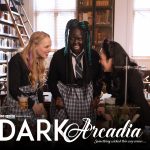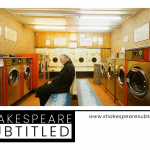Dark Arcadia and the wider Shakespeare Republic universe – Sally McLean
Dark Arcadia is the latest installment in the Shakespeare Republic universe. It is an online series taking Shakespeare’s characters and text as written and weaving them together to create a new story, set in a modern high school with a “touch of magic realism and a lot of food for thought”1. And it is the culmination of 10 years of my bringing short form Shakespeare to the screen.
To better understand how Dark Arcadia came to be, we need to go back a decade to when my long-running digital series, Shakespeare Republic, was beginning to take form.
It is April 2015, and we are preparing to film the first season of Shakespeare Republic with six actors: Alan Fletcher, Michala Banas, Ben Steel, Rowena Hutson, Billy Smedley and myself. I am also adapting, directing and producing. Originally conceived as “bite-sized Shakespeare”2, the series was intended to bring audiences to Shakespeare’s works who might not normally engage with the full plays, which included students, as well as actors and interested members of the general public. Why this focus? Because that was me before I attended drama school in London. Being dyslexic, I was not a fan of the Bard. All that changed with an excellent Shakespeare teacher and once I became a born-again Shakespearean, I wanted to help ease others into these works that so brilliantly explored and exposed the human experience.
The easiest and most effective way to do this I reasoned, was to present Shakespeare’s monologues and sonnets as stand-alone pieces or episodes, set in the 21st Century. And that has been the premise of the entire series from that day to this. It had a long gestation period. From the idea forming in the late 1990’s, which I enthusiastically discussed with my honorary patron for my production business, Sir Nigel Hawthorne, the first series finally sprang into being 20 years later with the advent of web series and a realization that this medium was the perfect vehicle for the concept.
Season One set the tone for these adaptations: Hamlet as Media Advisor to a government minister, Juliet as one half of a same-sex couple in a Skype conversation, Phebe as an entitled Gen Y drunk texting, Macbeth as a politician about to metaphorically knife an opponent, a female Hamlet weary from the corporate cut and thrust and a performance of Sonnet 18 as a eulogy.
Season Two brought in more actors, such as Nadine Garner, Christopher Kirby, Dean Haglund, Phoebe Anne Taylor and others and expanded to 13 episodes. It featured Viola as an inner-city hipster, Jaques as a melancholic barfly, Katherina as an ambitious politician’s wife, Henry V as a member of a laser strike team – and everything in-between. And then 2020 arrived and in response to the global pandemic, Season Three of the series was born, subtitled “The Lockdown Chronicles”, placing Shakespeare’s characters in lockdowns with the tagline “Twenty-four souls, six cities – one shared experience of being human.”3 The cast expanded again to include actors from London, Edinburgh, Glasgow, Los Angeles, New York and Melbourne, and grew to 24 episodes for that season.
When I first began this original series, I wasn’t sure how my approach to Shakespeare would be received, particularly as I gender flip the characters regularly and lean into diversity in my casting – and am irreverent in how I present the characters. But the response to the work has been wonderfully positive and I have been fascinated with others’ responses on social media and in the press, as well as in academic circles over the years. The series has been variously described as everything from “a metaphorical gauntlet”4, to “palpably metamodern”5, to “a powerful reminder of the ecological lesson of interrelatedness”6, to (my personal favourite) “Shakespearean Pringles”7. I love that my and my team’s work has evoked such illuminating discussions, which has made me reconsider and re-lens my choices when adapting Shakespeare’s work in turn.
Over the years, the series has gone on to win multiple international awards, been taught at high schools and universities, discussed at academic conferences and in academic text books, been invited and included in the official collection of the National Film and Sound Archive of Australia (and named as an acquisition highlight in their 2018/2019 annual report8), and reached hundreds of thousands of viewers around the globe across several different platforms.
From Shakespeare Republic, the work expanded further. First to the short film Speaking Daggers, commissioned by Independent Schools Victoria here in Australia for their inaugural Arts Learning Festival at the Australian Centre for the Moving Image (ACMI). Then Walking Shadows, the student version of Shakespeare Republic, commissioned by Howard Fine Acting Studio Australia for their graduating drama students, which has just released its third and final season online, and now; Dark Arcadia. Helming and adapting the equivalent of four feature films of Shakespeare screen content over this time meant that I had been living and breathing Shakespeare adaptation for a while and by 2023, I wanted to try something different.
Dark Arcadia was a passion project, much like the first season of Shakespeare Republic. I wanted to stretch my wings with Shakespeare adaptation and see if I could create a new world and new stories using his texts and characters. A Shakespearean Into The Woods, if you will.
I was very lucky to be awarded grants from Creative Victoria, City of Melbourne and Creative Australia, and the British Shakespeare Association kindly awarded me a Small Events Grant to top up the budget. The remaining monies were crowdfunded via the Australian Cultural Fund and my production business’ Patreon Fund.
So, on a blustery Winter’s June day in 2023, myself and my team found ourselves standing in the Quad of Ormond College at Melbourne University surrounded by cast and crew, ready to begin filming this new adventure called Dark Arcadia.
Dark Arcadia is a female-led story, dealing with issues that women and girls still face today and we had an extraordinary cast who answered the call. I always have parity with male to female cast numbers, often erring on the side of more female and female-presenting actors. In this series, we also had non-binary, trans, culturally diverse and disabled actors and they were all fabulous humans and very talented creatives. I feel blessed to have found such a generous, gifted group of actors to bring Shakespeare’s words to life in Dark Arcadia and am so thrilled that I can showcase the talent available in Melbourne in this way. Some had Shakespeare experience, many had none – all of them brought this world and his words to vibrant life under my direction and I will always be grateful to all of them.
We filmed the three episodes over three and a half days, which also included a performance of The Willow Song, set to new music written by Sass Pinci. I still don’t know how we did it. My crew were amazing at moving like a well-oiled machine and I am so grateful to all of them for enabling us to get through the schedule as efficiently as we did. I am especially grateful to my three fellow producers: Billy Smedley, Phoebe Anne Taylor and Sass Pinci who were with me in the trenches in front of and behind the camera and fourth producer, Christopher Kirby, for being on the end of a phone with support from another film set he was working on at the time.
Post-production took just over six months, but, by February 2024, the edit was completed. The trailer for Dark Arcadia was finally released to the public on April 3, 2024, and the series released in full on April 28.
Again, I didn’t know how it would be received. I had taken a range of different characters from seven different plays using Shakespeare’s text, as written, set them in the microcosm of an Australian high school where they interact with each other, despite being in different plays, explored the concepts of power, relationships, women’s rights, outrage culture and fake news, and gave it the tone of the modern equivalent of a Grimm’s fairytale. Hamlet as Claudio and Don Pedro’s best friend? Hero as part of the three witches’ girl gang? Lord and Lady M trying to depose Edward York as Principal because he propositions one of the young female teachers? It shouldn’t work. But somehow, it did. And we have been pleasantly surprised at the reception for the work, particularly among our filmmaking peers around the world.
Since it’s release, Dark Arcadia has been officially selected for 25 international film festivals, been nominated for 55 awards and won 15 awards to date9, as well as being named in the Top 10 web series globally for 2024 out of a field of 475 series produced that year10. And Dark Arcadia continues its merry way around the international festival circuit, with its next screening coming up as an official selection at the New Bedford Film Festival in Massachusetts, USA in mid-April 2025.
I am so grateful to the British Shakespeare Association for their support of Dark Arcadia. And in this tenth anniversary year for Shakespeare Republic and the expanded universe of projects, we are looking forward to highlighting Dark Arcadia and the BSA’s support again to our audiences and the wider public alongside all our other Shakespeare projects from 2015 to now.
Will I play with the Bard’s works again in this way? I don’t know. The traditionalist in me wonders if I am being too cavalier with his work; if I have crossed a line. But it was so much fun playing with his characters and text like this. Knowing that Dark Arcadia has brought more people to Shakespeare’s plays, which we gleaned through audience feedback, means that I’ve also stayed true to the mission: making his work of interest to those who might not normally engage. So, who knows what the future holds? Shakespeare Republic Season Four beckons and ultimately, Shakespeare and his canon of work are robust and thriving, and more than able to endure a little, very respectful meddling on my part.
—————-
—————-
Works cited
1 ‘About the series’, Dark Arcadia official website, 18th April, 2024. Available at: https://darkarcadia.com/about-the-series/ [Accessed 17th February 2025]
2 McLean, S. ‘Byte-Size Shakespeare: The Irreverent Play of Shakespeare Republic’. Editors: Gerzic, M & Norrie, A. Playfulness in Shakespearean Adaptations (Routledge 2022), p. 115.
3 ‘About Season Three’, Shakespeare Republic official website, 17th February, 2021. Available at: https://shakespearerepublic.com/about-season-three/ [Accessed 19th February 2025]
4 Tambasco, T. ‘Review of Shakespeare Republic’. Borrowers And Lenders: The Journal of Shakespeare and Appropriation, Vol. 13 No. 2 (2020), Fall/Winter 2020. Available at: https://borrowers-ojs-azsu.tdl.org/borrowers/article/view/95/188 [Accessed 19th February 2025]
5 Broadribb, B. ‘Lockdown Shakespeare and the Metamodern Sensibility’, Editors: Allred, GK. Broadribb, B & Sullivan, E. Lockdown Shakespeare: New Evolutions in Performance and Adaptation (The Arden Shakespeare, Bloomsbury 2022), p. 57.
6 Garganourakis, J. ‘Review of Shakespeare Republic: #AllTheWebsAStage (The Lockdown Chronicles)’. Shakespeare Bulletin, Vol. 39 No. 2, 2021, p. 278. Available at Project MUSE, https://dx.doi.org/10.1353/shb.2021.0025 [Accessed 19th February 2025]
7 Benjamin Broadribb [@Ben_Broadribb]. (2021, April 11). Revisiting @incognitagal’s wonderful @ShakesRepublic #AllTheWebsAStage short films for my Lockdown Shakespeare collection chapter, and they really are like Shakespearean Pringles: once I press play, I just can’t stop! I can’t wait to see what this project does next [Tweet]. X. https://x.com/Ben_Broadribb/status/1380919707163881485 [Accessed 19th February 2025]
8 Appendix 3: NFSA Acquisition highlights 2018-19, Australian Government Transparency Portal, 2019. Available at: https://www.transparency.gov.au/publications/communications-and-the-arts/national-film-and-sound-archive-of-australia/national-film-and-sound-archive-of-australia-annual-report-2018-19/section-four%3A-appendices/appendix-3%3A-acquisition-highlights-2018-19 [Accessed 22nd February 2025]
9 ‘Awards & Screenings’, Dark Arcadia official website, 29th April, 2024. Available at: https://darkarcadia.com/screenings/ [Accessed 18th February 2025]
10 ‘2024: Season 10!’, Web Series World Cup official website, December, 2024. Available at: https://wswc.info/2024-2 [Accessed 18th February 2025]
Header image courtesy of Sally McLean/Incognita Enterprises.







